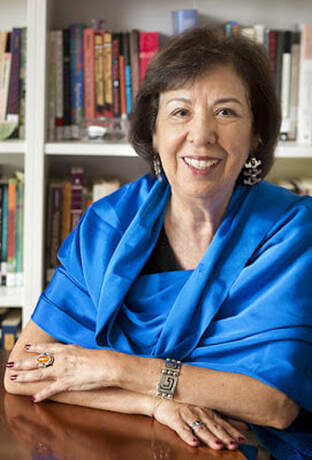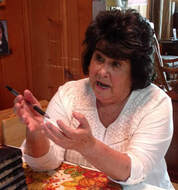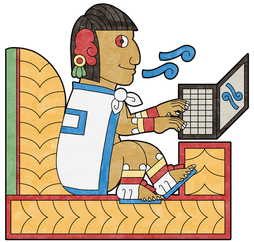A Book Review of Cabañuelas, a novel by Norma Elia Cantú By Rosa Martha Villarreal Dr. Norma E. Cantu describes her fiction as “creative autobiographic ethnography.” Judging from the blurbs on the cover of Cabañuelas and other commentary about her earlier book, Canícula, the post-modern aspects of the novel will be analyzed in full detail: it’s fusion of various genres, including the scholarly and biography; it’s use of photography as a narrative tool; it’s a deeply personal portrayal of family and hearth; the descriptions of Spain’s festivals; and finally, its use of narrative as political discourse. But Cabañuelas is more than that. More than a romance; more than an ethnographic journey; more than one Chicana’s search for the ancient roots of her Mexican-Tejana culture. In this novel, the word “cabañuelas” alludes to a rediscovery of the most ancient knowledge of human passions and aspirations. Technically, the cabañuelas are a system of weather prediction, a lost art, a knowledge discarded by the science of meteorology and dismissed as superstition. But what we have discovered in our post-modern era is that beneath the surface of these so-called folk practices and superstitions are a kernel of the authentic human landscape of passion and experience, a form of knowledge found only in the language of dreams. Thus, the cabañuelas are a metaphor for the existential journey of the protagonist, Nena. Once she makes the decision to search for the ancient origins of her culture’s festivals in Spain, her spiritual calendar has been marked, and a destiny gets set in motion. The journey transcends from ethnography to the phenomenological discovery of the secret self, the self that is not a creature of human constructs but of nature and God. Even before Nena Cantu departs for Madrid on a Fulbright Fellowship, she longingly reflects on her family, her homeland, and its rituals. Thus, nostalgia commences her spiritual cabañuela. Her nostalgia for the origins of these rituals is what inspires her research. Her arrival in Spain is reminiscent of every Hispanic’s first experience: Spain is simultaneously foreign but familial. You are not a Spaniard, but idioms aside, you speak the same language and are shaped by the sensibility of that language. You are a continuation of a mestizaje that began in antiquity when the Romans conquered the Iberian Celts, and continued with the subsequent conquests of Germanic tribes, and finally the Moors. It isn’t long before Nena decides that to find the true origins of the festivals, she must not merely study them in the ancient texts but go and experience them first hand throughout Spain. It is in these journeys that she crosses over from the world we perceive to the world as it really is. That other world, exiled to the margins by our constructs of reason and morality, where there is also truth and beauty, and perhaps the nexus to a spiritual world. The festivals are the relics of the ancient dramas of collective awareness of an invisible universe. It is in that landscape of festivals and timelessness that Nena finds a love that cannot be explained, only experienced. Love before Logos, reason, history, and politics. It is the descent into the body of another who is not only meant for us, but has authored the secrets of our psyche. Someone only you can recognize because you understand in that other language that he is the door to your secret self, to your other self behind the mask of the face that meets the faces that you meet, as T.S. Eliot said. “That’s him?” One of Nena’s friends asks incredulously years after she returns to Madrid. When a Chicana polemicist reminds Nena that he is a member of the conquering race, Nena thinks, but he is human. And that is it: The greater truth. Before we were all else, we were an animal like the rest until we discovered a world beyond. The birth of higher consciousness set us on a separate destiny: the spiritual, and the discovery that the passion of the flesh with one other human would unite us with the spiritual. Passion and spirituality are the same, Sor Juana de la Cruz said. Not the mere sexual release and innate drive to reproduce encoded by evolution; not the patriarchal version of marriage, where women’s aspiration are oppressed in the name of societal good. Something so old we cannot not quantify it but know it is real because we feel it; the knowledge of the flesh and the semiotic language of dreams and intuition. “Before God was love,” said D.H. Lawrence. Nena’s cabañuelas creates her destiny, and Paco is part of that destiny. But so is return. The destiny was set in motion by the nostalgia for the origins of her cultural self. It must be, then, that she’d return although the love she found was profound, magical in the pre-modern definition of magical. That love could have only been discovered in a temporal space. It is a hard thing to realize that a powerful human connection such as hers and Paco’s does not mean it translates to a life together, to “live happily ever after” although that is also a possibility depending on the couple. Paco expects her to sacrifice her homeland for him, but does not offer to do the same. She would have to give up the very thing that started her journey in the first place. Regardless, despite her returning to Texas, the love never ends. It is untouched by time and never replaced by other lovers. My grandfather José used to love a song that was already old when he was born. Un Viejo amor, ni se olvida ni se deja. Never were wiser words spoken. Ultimately, despite the fusion of various genres, its ethnographic contribution, this novel is also about a woman’s existential search where she repeats the ancient, archetypical journey. She sets out to find her cultural identity and finds her ancient human identity. If there is a succinct image for that, it is her self-portrait, the artist, half-hidden behind the camera lens, at once concealed and revealed. Read an excerpt from Cabañuelas: A Novel by Norma Elia Cantú (University of New Mexico Press, 2019) on Somos en escrito under the title, “The women take over the town for a day” (https://somosenescrito.weebly.com/fiction-ficcioacuten). The book is available through the University of New Mexico Press (https://unmpress.com/books/cabanuelas/9780826360618) and on Amazon. .  Norma Elia Cantú, author of Cabañuelas: A Novel, is the Norine R. and T. Frank Murchison Distinguished Professor of the Humanities at Trinity University, San Antonio, Texas. Her recent works include Transcendental Train Yard: A Collaborative Suite of Serigraphs, Canícula: Snapshots of a Girlhood en la Frontera, Updated Edition (UNM Press), and the coedited anthology Entre Guadalupe y Malinche: Tejanas in Literature and Art.  Rosa Martha Villarreal, a Chicana novelist and essayist, is a descendant of the 16th century Spanish and Tlaxcatecan settlers of Nuevo Leon, Mexico. She drew upon her family history in her critically acclaimed novels Doctor Magdalena, Chronicles of Air and Dreams: A Novel of Mexico,and The Stillness of Love and Exile, the latter a recipient of the Josephine Miles PEN Literary Award and a Silver Medalist in the Independent Publishers Book Award (2008). She writes a column, “Tertullian’s Corner,” for Somos en escrito Magazine.
0 Comments
Three related commentaries by a contributor follow. For too long, the indigenous-hispanic origin people in the U.S. have by default permitted institutions and individuals outside our community to impose their will as to what we are supposed to be called. The terms, Hispanic and Latino, were conjured up by federal agencies, the U.S. Census Bureau and the Office of Budget Management, back in the 1970s and 1980s.
For some four decades, we have groused and prattled about how unjust it was to have these labels foisted on such a diverse population as ours, multiethnic, multicultural and multi-politicized. But no one did anything about it, including myself. I just complained and had a lurch in my stomach when someone used the word, hispanic, as a noun. (N.B.: I no longer capitalize hispanic to emphasize its sole use as an adjective.) Comes now a segment of our community seeking a gender neutral and yet inclusive term for what I call indigenous-hispanic Americans—not exactly a phrase that rolls off the tongue easily and quickly. What I’ve concluded is that all of us have to get together to evolve a term that is ours, that meets the criteria I’ve loosely set out above, and arrive at a consensus, by coming to our combined senses. In an earlier piece (To_X_or_Not_To_X − Part I), I argued for assembling one or more conclaves throughout the U.S.A. where we would have full discussions about the issue, and agree on a term that would describe/nickname/label who we are: the term would signify our identity, but it must be organic, that is, deriving from our own reality and worldview. We are essentially mestizaje, a people evolved from the blending of different cultures into one: the Hispanic or Spanish which is of European origin, and the indigenous which is our peculiar bond to the land now known as the Americas. Hence, my use of the term, indigenous Hispanic American. I object and, I believe, many others who care about such things also object, that the term, LatinX, was decided upon, given the trappings of an otherwise deliberated notion and then accepted sin más in knee-jerk fashion by organizations and institutions who were reacting most likely to the underlying pursuit of a self-identifying term that would be gender neutral. I assert that the Latinate or Hispanican community should address that concern but approach its resolution using an organic and inclusive-democratic process. Otherwise, we are merely re-enforcing the damage done by bureaucrats in D.C. who knew nothing of nuance let alone the history and culture of the Latinan people in the U.S. and rather than a unifying term, foisted a divisive title upon us, which some advocates seek to supplant by foisting a really eXotic term on all indigenous-hispanic origin peoples in the U.S. One other criteria, which has been generally accepted though not articulated, is that the designation be derived from the Spanish language rather than English. While the reasons may be obvious, it would be worth our time to make them specific. Spanish is the lengua franca of the indigenous-hispanic Americans along with another 500 million people worldwide, which makes it the second most widely spoken language by native speakers. Our lineage does not derive from the Anglo Saxon world; in fact, our Spanish blood is directly affiliated through war, occupation and trade with the African, Arab, Hebrew and other cultures around the Mediterranean Sea. Yesenia Padilla, the writer of an article in compleX.com, a website, titled, “What does ‘LatinX’ mean? A look at the term that's challenging gender norms,” says, “By dismantling some of the gendering (my emphasis) within Spanish, LatinX helped modernize the idea of a pan-Latin American eXperience—or Latinidad--one that reflects what it means to be of Latin American descent in today’s world. The term also better reflects Latin America's diversity, which is more in line with intersectionality, the study of the ways that different forms of oppression (e.g. seXism, racism, classism, and heteroseXism) intersect.” What proponents of the X don’t seem to realize or ignore is that the U.S. experience for Latinidad is totally different from any other Latin American population. The only demonym I know of in the U.S. that evolved from within is the word Chicano, which conveys an origin of indigenous Mexican and Spanish European descent. The intersectionalities Padilla clicks off go far beyond what the simple replacement of vowels with an X can resolve; it may even cloud the underlying issues. She goes on to quote Professors María R. Scharrón-del Río and Alan A. Aja, who defend the term, arguing that it should replace "Latino" when referring to people of Latin American descent. They say moving towards non-gendered language is a way to escape the ghost of colonialism that still haunts Latin American culture. What “ghost?” Latinians face a neocolonialism right now! We are still being labelled from outside our communities; we are still treated as second-class residents of a country of which our forebears, native and colonialist, were its earliest civilizers; we are labelled as “an immigrant people” in order to keep us subordinated to the majority population even though we, as indigenous and early colonizers, were here hundreds and even thousands of years before the non-hispanic Europeans. Substituting a gender ending with an X re-enforces two socio-psychological realities: the neocolonialism we have had to endure for centuries and the Black Legend effect, which originated in the era of exploration when adventurers likes Columbus bumbled their way across oceans to “discover” new lands, ushering a new era of eXploitation. The latter has persisted for centuries and undergirds the racist stereotyping of indigenous-hispanic origin peoples in the U.S. and the Americas. In other words, our community is adversely affected for being indigenous and of hispanic origin. Scharrón-del Río and Aja write, according to Padilla, that, "LatinX" actually represents the people the term is supposed to represent, so it's "a concerted attempt at inclusivity" that "fosters solidarity with all of our LatinX community." What the original proponents of the X factor failed to realize or chose to ignore was that they were attacking a language that is not theirs to manipulate unilaterally, and introduced a factor, the X, which supposedly addresses a pan-American concern with a binary idiom. In effect, they seek to address a social dynamic, gender disambiguation, which has nothing to do with noun endings, by seeking to turn an entire language upside down. I propose we eXplore the language to find a term which we can all agree is gender neutral, organic, logical and does not do violence to the language of Cervantes, de la Cruz, Lorca, García Marquez, Neruda (some of my favorite masters of the Spanish idiom). We should address the concern for a gender neutral term which could resolve the demand for inclusivity, through a process that is organic, arising from the nature of the language and its cultural foundation, which dates back to al-Andalus of 13th century Spain. As another contributor to Somos en escrito, Sonny Boy Arias, put it so subtly, “I don’t need no stinkin’ X factor to tell me who I am or what I stand for. I got 500 years of X factor and all it got me was new forms of X factor, bato!” Let’s not fall into the trap that Alexis de Tocqueville cautioned against in Democracy in America,that we may reach a point where we over-democratize, even in our words, and it will affect all symbolic meanings in everything we do—to the point of absurdity. Armando Rendón −Editor oooooo0000oooooo Three commentaries on the power of X by Ray Padilla, a retired professor of education, posit a candidate for how to label people of Chicanan ancestry, that is, the mestizo of Mexican-U.S. evolution, based on shared biological, political and ethnocentric values. Although Padilla focuses on Chicanada, his principles are applicable to the broader and greater discourse we must have to arrive at a label that works for everyone born or living in the U.S. of mixed indo-hispano ancestry. I recognize some readers out there might object to the idea they might be lumped in as either indo or hispano, but the term is a construct offered for the sake of argument—work with me. Commentary I, first put forth on October 18, 2016, in LaRed Latina, a listserv By Ray Padilla There is a simple yet important concept in the academic world that goes a long way toward reducing confusion in thought. It is the concept of "unit of analysis". When considering any phenomenon, it is critical that we know what we are talking about. Therefore, knowing the unit of analysis is critical. Here is an example from education. Suppose that we are interested in the topic of educational attainment. The question is: What is the unit of analysis? Is it the individual student? The classroom? The school? The school district? The state? The nation? Comparisons in educational attainment can be made across all these units of analysis. So it is necessary to be clear as to which unit of analysis we are discussing. The unit of analysis will determine what evidence we can bring into the discussion and how we make our comparisons. Note this: Standing alone, no unit of analysis is more or less important than any of the others. However, for whatever reason, we may choose to focus on one unit of analysis as opposed to another in any particular discussion. Yet, in a different discussion some other unit of analysis could come to the foreground. Now switch topics. Say we are discussing the universe of peoples that we might label collectively as "Indo-Hispanic". These are the people that resulted from the Spanish conquest of the two American continents. In Spanish, the term used historically is "Indo-Hispano." It is related to the term "Hispano Americano," which historically was used to designate the peoples of the Americas that populated the Spanish empire in the place called "Hispano America." The term "mestizo" is equivalent to Indo-Hispano with the direct reference to ethnicity eliminated. Mestizo power began to emerge after the wars of independence from the hegemony of Spain. In the twentieth century, the concept of mestizaje has bifurcated so that it has taken somewhat different paths on either side of the U.S.-Mexico border. Some authors think that mestizaje south of the border still privileges Europeans while the sameconcept north of the border is used as a way to resist the racialized ways in which mestizos have beentreated in the U.S. But here is the central issue: If we want to refer to the collectivity of Indo-Hispanos or mestizos, what term should we use? Of course, we could use either of these terms but these terms seem to be outdated in the context of U.S. ethnic and racial diversity. In the last 50 years or so two terms emerged as favored candidates for a proper name: Latinos and Hispanics. Of course, there were others, but these two seem to have the most sticking power. In spite of their favored status, these two terms have generated much heat and controversy. The uproar is related to ideology, politics, tribalism, and plain old misunderstanding (especially about the unit of analysis). No need to rehash here the controversy because lots of keystrokes have been devoted to this controversy on this forum. Yet, anyone with even an ounce of political savvy knows that keeping the mestizos apart in little tribes is no way to gain political power and all that it entails. Ways must be sought to bring together the great mestizo people into one population that can act to promote its own interests. But how can that be done if we can't even agree on what to name the collectivity? So here is a modest proposal: Let's invent a new name. All people go through different name changes until they hit upon the one that best suits them. Look at this sequence: Negro, Black, Afro, Afro-American, African American. Never mind that negro means exactly black. What is the name? Xkanx. Either X is pronounced "shi". So the word is pronounced shi-kan'-shi. Some features: The word is both male and female; it is both singular and plural; it refers both to the people and the land they inhabit; it replaces mestizo. So we are the Xkanx people. Under this large unit of analysis there are many nationality groups, ethnic groups, racial groups, etc. The term does not require that, for example, Puertorriqueños, Cubanos, Chicanos, etc. stop being themselves. It all depends on the unit of analysis. And when we discuss a relevant topic we must keep in mind the unit of analysis. So Latino-phobes rejoice! Hispano-phobes rejoice! You are a Xkanx and that is that. Underneath that general rubric you can be whatever you wish to be at a different level of analysis. But remember this: Tribalism only works if it is open to transactions across tribes. So OPEN tribalism is the order of the day. CLOSED tribalism is self-extinguishing. And for those who are wide awake: Xkanx is, like mestizo, biologically driven. Developing a Xkanx culture and consciousness is a matter of socialization. oo0oo Commentary II, on XikanX, also on LaRed Latina By Ray Padilla As evident from various past postings that I made to LaRed Latina, I consider the Chicano identity (really identities) and correlative labels to be a quintessentially postmodern identity, by which I mean that the identity is conditional, circumstantial, dynamically changing, uncertain, provocative, trans-racial, historically evolving, politically laden, etc. Much the same can be said about the Latino identity. The Newtonian universe of absolute categories went out over a hundred years ago with the advances in physics made by Albert Einstein. After that, philosophy became a free for all. We Chicanada were ahead of our time, but not necessarily by choice. We became a postmodern people early on due to the vicissitudes of history, including the Columbian incursion into the Americas and the big stick of Uncle Sam, not to mention our own Mexican penchant for government of the few, for the few, by the few (fuchi government). As La Raza evolves historically, there will be a natural tendency to form ever larger groupings. This will entail shifts in identities to enclose more diversity while maintaining some common ground as the basis for coming together. What is important is to look beyond the labels and identities to ascertain whether or not we are moving forward in increasing our economic and political power. Also, and this is important, whether or not we are moving in a more democratic direction. The U.S. as a whole, and other nations worldwide, are now catching up with La Raza in terms of becoming postmodern peoples. But the first thing that the postmodern people of the U.S. did was to elect a postmodern president. How will our democracy fare? Postmodernity by definition is highly relativized and we have to wonder whether our classical ideas about democracy can stand the chaos. Keeping these points in mind, earlier I proposed a new movement of La Raza that includes a new identity and grouping. I proposed the term "XikanX" (pronounced Shi-Kan-Shi, with stress on the last syllable). The term includes all the people who resulted from the intermingling of Native Americans with the various peoples who invaded or were brought to the American continents. oo0oo Commentary Part III, first presented on November 11, 2016 in LaRed Latina, a listserv For some time now, I have been trying to introduce Raza and Chicanada to new political thinking. Chicanada seem to be stuck politically somewhere between the old corrupt politics of Mexico and Latin America and the great U.S. experiment in democracy. The former is seen by Chicanada as something to avoid like the plague and the latter is seen as irrelevant and inscrutable. Thus, we are dubbed the "sleeping giant." The great principle of U.S. politics is that individuals will rationally pursue their self-interest (NOTE: self-interest is not necessarily equal to selfish-interest). A corollary to this principle is that it is legitimate for individuals to use the power of government to pursue their self-interest (self-interest does not include corruption or illegal activity). Following this principle, it was quickly realized by the U.S. electorate that a way to gain political empowerment was to ban together with people who shared similar interests and to vote as a block. That behavior quickly led to the organization of political parties. A second consequence of the great principle is that individuals and interest groups quickly realized that to gain political power it was necessary to form coalitions. People don't have to agree on everything. If they can agree on something then they form a coalition with others to gain enough political power to achieve a specific goal. When interests diverge the coalitions fall apart and other coalitions form. So for Chicanada and Raza to gain political power we need to understand the underlying principles of U.S. politics. What counts politically in the U.S. is amassing a large volume of votes in order to prevail. This means that Chicanada and Raza must assemble large voting blocs through groupings that share ideology and through coalitions that are ad hoc. This approach means that we need to expand our notions of who we are and that we are not isolating ourselves into some kind of purist notion of ethnicity. The Chicano identity, as espoused by El Movimiento, turns out to be too restrictive to achieve a wide political base. Moreover, a narrow, ethnically based identity tends to restrict our ability to create coalitions of similar interests because we become absorbed by our own ethnocentricity. As a result of all this (and a great deal more that could be added), I have advocated that we move to a biologically based identity. You may recall my proposal for an AmerEEcan identity. The most recent proposal that I made calls for full recognition of our enormous genetic diversity. The label that I proposed to recognize our biologically based diversity is “Xkanx.” The Xkanx people will include millions of individuals that have resulted from the epic encounter between the peoples of the American continents and the rest of the world. It is this mestizo group, in the context of U.S. politics that can have a huge impact on the course of U.S. and world history. In short, I no longer see Chicanada as a marginalized ethnic group that seems to have nowhere to go. I see Chicanada as the potential avant garde of the Xkanx. But we need to stop thinking naively about U.S. politics and base our political behavior on a sophisticated understanding of the U.S. political system. And we need to be clear as to who we are and who we can become. Ray Padilla, El Vato de Sananto, earned a doctorate in Higher Education Administration at UC Berkeley in the early 1970s, taught at Arizona State University for 19 years before joining the UT San Antonio faculty in 2001 where he retired in 2009. He has deep roots in San Antonio, he says, as his grandparents worked their way through there more than a hundred years ago on their way to Chicago. |
Archives
June 2024
Categories
All
|
Donate and Make Literature Happen
is published by the Somos En Escrito Literary Foundation,
a 501 (c) (3) non-profit, tax-exempt corporation. EIN 81-3162209




 RSS Feed
RSS Feed